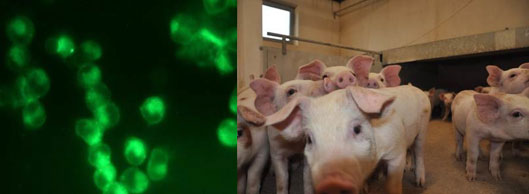Parasites, Immunology and Gut Health (PIGH)
 The objective of our research is to understand the interactions between gastrointestinal pathogens and host immune function and metabolism. We aim to develop new tools which can be used to promote intestinal health, regulate inflammation and control disease.
The objective of our research is to understand the interactions between gastrointestinal pathogens and host immune function and metabolism. We aim to develop new tools which can be used to promote intestinal health, regulate inflammation and control disease.
"Our overall aim is to understand how intestinal pathogens interact with the host diet, immune system and microbiome, and use this knowledge to develop new tools to promote gut health in animals and humans’", Associate Professor Andrew Williams, Group Leader.
Diet-immunology-pathogen interactions - We aim to explore how various dietary components regulate immunity and intestinal inflammation. We work with mucosal-dwelling parasites as an infection system in both swine and rodent models, as well as in vitro studies with primary and cultured cells.
Regulation of the immune system by parasite products – Parasitic worms have evolved to establish chronic infections in their host, achieved in part by active modulation and suppression of the host immune system. We explore the mechanisms behind this immune-modulation, with the aim of developing new tools that can be used to treat autoimmune diseases as well as controlling chronic infections in parasite-endemic areas.
Novel control of parasitic infections of veterinary importance – We are investigating the use of new feed additives and isolated plant compounds as novel tools to treat parasitic infections in livestock (swine, cattle), and promote a healthy gut microbiome and nutrient metabolism. This involves in vitro screening of different molecules for anti-parasitic effects and in vivo studies to determine effects on animal health.
Myhill et al. 2018. Mucosal barrier and Th2 immune responses are enhanced by dietary inulin in pigs infected with Trichuris suis. Frontiers in Immunology, 9:2557. https://www.frontiersin.org/articles/10.3389/fimmu.2018.02557/full
This study showed that dietary prebiotics interact with helminths in the colon to regulate inflammatory responses and gut microbiota composition in pigs.
Midttun et al. 2018. Ascaris suum infection down-regulates inflammatory pathways in the pig intestine in vivo and in human dendritic cells in vitro. The Journal of Infectious Diseases, 217, 310-319.https://academic.oup.com/jid/article/217/2/310/4608044
In this study, we showed that chronic Ascaris infection in pigs suppressed inflammatory pathways in the gut, and the same pathways are inhibited in human dendritic cells exposed in vitro to Ascaris antigens.
Almeida et al. 2018. Modulation of human macrophage activity by Ascaris antigens is dependent on macrophage polarization state. Immunobiology, 223, 405-412. https://www.sciencedirect.com/science/article/pii/S0171298517302103
Here we showed that the polarization state of human macrophages is a key factor regulating the suppression of inflammatory responses induced by exposure to Ascaris antigens.
Our research takes place with a large network of international collaborators, and is funded largely by the Independent Research Fund Denmark, the Novo Nordisk Foundation, the Lundbeck Foundation, GUDP, and the Carlsberg Foundation.
Group/project members
| Name | Title | Phone | |
|---|---|---|---|
| Jensen, Anne Majgaard | PhD Fellow | +4535328540 | |
| Klein-Ipsen, Pernille | PhD Fellow | +4535329678 | |
| Pan, Geng | PhD Fellow | +4535329241 | |
| Sharma, Mona | Postdoc | +4535334846 | |
| Vedsted-Jakobsen, Amalie | PhD Fellow | +4535329726 | |
| Williams, Andrew Richard | Professor | +4535332797 | |
| von Münchow, Alexandra Soraya G L | PhD Fellow |
External researchers
| Name | |
| Katrine Damgaard Winther, PhD student | kfs846@sund.ku.dk |
Master students |
|
|
Eva Katrine Kjær Rasmussen, 1.8.2024 Sara Fuglsang Olsen, 1.8.2024 |

